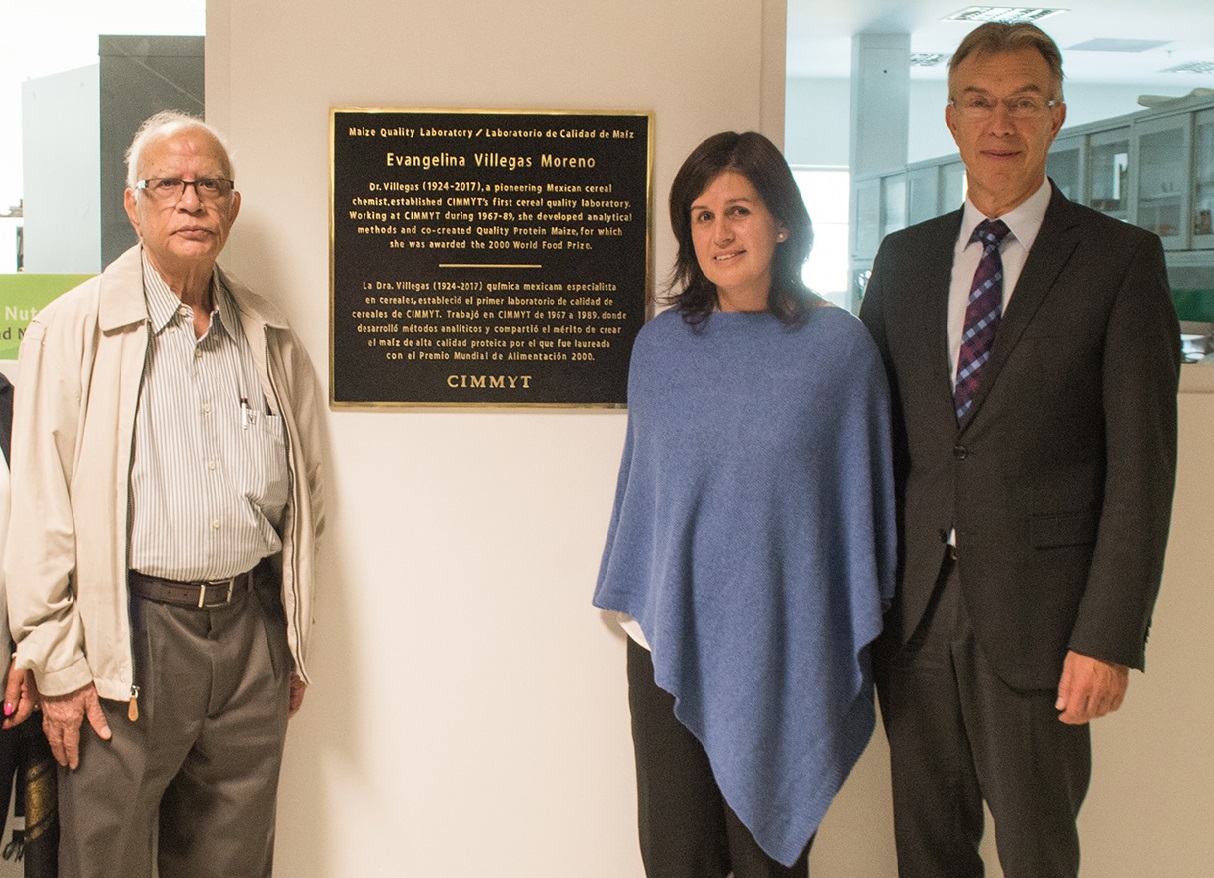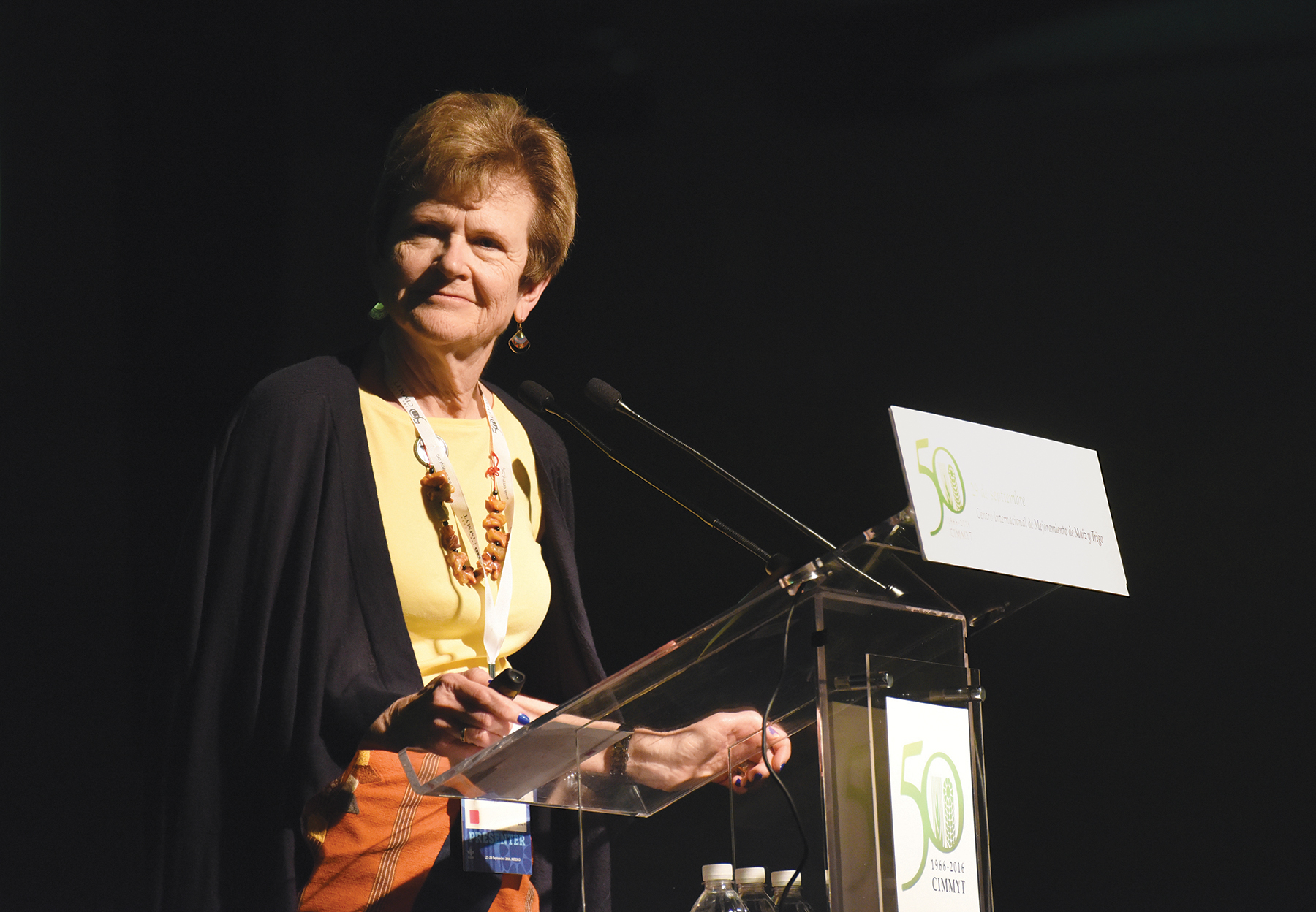
El BATAN, Mexico, (CIMMYT) – To celebrate and expand the legacy of the late Evangelina Villegas Moreno, a pioneering Mexican cereal chemist who won the 2000 World Food Prize for co-developing quality protein maize, the International Maize and Wheat Improvement Center (CIMMYT) has named its maize quality laboratory in her honor.
A memorial plaque was unveiled on 6 June by Martin Kropff, CIMMYT’s director general, at the entrance of the CIMMYT lab that generates crucial grain quality data for the center’s global maize breeding efforts.
“What better way to honor Dr. Villegas’ accomplishments than to have a CIMMYT maize quality lab named after her?” Kropff said. “The center is proud to have counted among its ranks a professional like Dr. Villegas, a pioneering Mexican scientist whose contributions to nutrition and food security will continue to resonate in impoverished regions.”
Breeding lines and populations from CIMMYT’s maize program are used in 100 countries and result in high-yielding, resilient varieties and hybrids grown on at least 20 million hectares throughout the tropics and subtropics.
One derivative of that work, known as quality protein maize (QPM), was developed by Villegas and Surinder K. Vasal, another former CIMMYT maize breeder and distinguished scientist, with whom she shared the 2000 World Food Prize.
Maize grain is rich in carbohydrates but poor in protein. In particular, it is lacking in the amino acids lysine and tryptophan, which are key protein building blocks in human diets. QPM grain contains more of those amino acids and so offers better nutrition for people with heavily maize-based diets, as is the case in parts of Latin America and sub-Saharan Africa.
A 2009 study in the science journal Food Policy found that eating QPM instead of conventional maize resulted in respective 12 and 9 percent increases in growth rates for weight and height, in infants and young children with mild-to-moderate undernutrition and where maize constituted the major staple food.
“Today, almost 30 years after Villegas retired from CIMMYT, the chemical and analytical approaches she developed still underpin work to monitor protein quality in QPM,” said Natalia Palacios, CIMMYT maize nutrition quality specialist and current head of the renamed lab. Together with Kropff, Vasal and Villegas’ sister, Juana Villegas Moreno, Palacios helped unveil the new plaque in a ceremony attended by 100 current and former CIMMYT personnel and Villegas’ family members.
Groundbreaker in science and society
Known as “Eva” to colleagues, Villegas, who passed away in April 2017, was born in Mexico City in 1924 and earned a Bachelor of Science degree in chemistry and biology at Mexico’s National Polytechnic Institute, at a time when higher education for women was still a novelty.
In 1950, she began her career as a chemist and researcher at Mexico’s National Institute of Nutrition and at the Office of Special Studies, an initiative funded by the Rockefeller Foundation and the Mexican government that was CIMMYT’s precursor.
She returned to CIMMYT in 1967, after earning a Master of Science degree in cereal technology from Kansas State University and a doctoral degree in cereal chemistry and breeding from North Dakota State University.
Villegas worked with Vasal in CIMMYT’s QPM breeding program, which operated from 1970 to 1985. Requiring the capacity to select for intricate gene combinations before the advent of DNA markers or genetic engineering, the program could not have succeeded without the support of Villegas’ lab and science, according to Vasal.
“I would call it exemplary interdisciplinary work (for) a breeder and a biochemist,” said Vasal. “Her lab analyzed 26,000 grain samples or more a year and provided the data in time for us to sow or pollinate experimental lines. Eva also furnished valuable critical suggestions that improved our breeding work.”
In a message read at the unveiling, Sanjaya Rajaram, 2014 World Food Prize recipient and former CIMMYT wheat scientist and program director, recalled Villegas’s significant contributions to the center’s wheat breeding research, which included establishing the center’s wheat industrial quality lab.
An inspiration in science to improve nutrition
Villegas’ prizes and professional recognitions include the 2000 Woman of the Year award of the Mexican Women’s Association, presented to her by former Mexican President Ernesto Zedillo. In 2001 Villegas was named to Alpha Delta Kappa’s prestigious list of International Women of Distinction and received the Lazaro Cardenas Medal from the National Polytechnic Institute. In 2013 Kansas State University (KSU) honored Villegas with an Outstanding Alumni Award.
“As a scientist, as a woman and as a Mexican, Villegas will continue to inspire future generations working to enhance food security and nutrition for the disadvantaged,” said Palacios.

 Gender equality, youth and social inclusion
Gender equality, youth and social inclusion 

